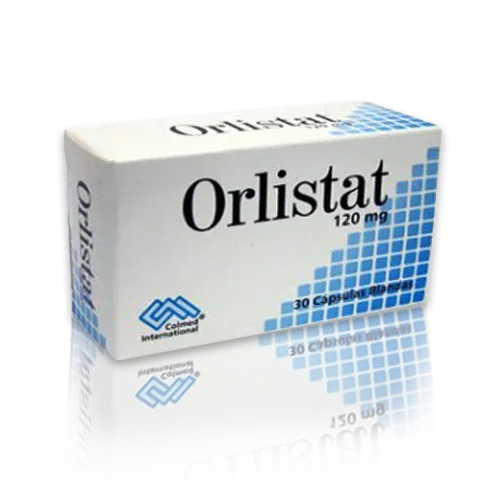Overview
Orlistat, marketed as Xenical (prescription) and Alli (over-the-counter), is a weight-loss medication that inhibits dietary fat absorption, reducing caloric intake. It is prescribed for overweight or obese individuals committed to a reduced-calorie diet and regular exercise, aiding in weight loss and preventing weight regain.
History of Development and Approval
Developed by Roche, Orlistat was approved by the FDA in 1999 as Xenical for prescription use. In 2007, a lower-dose version, Alli, was approved for over-the-counter sale. Extensive clinical trials have established its safety and efficacy for weight management.
Key Benefits
- Weight Loss: Reduces body weight by blocking ~30% of dietary fat absorption.
- Metabolic Improvements: Enhances blood pressure, cholesterol, and blood sugar control.
- Weight Maintenance: Prevents weight regain with diet and exercise adherence.
- Accessibility: Available in prescription (Xenical) and over-the-counter (Alli) forms.
Unique Properties
Orlistat’s non-systemic action inhibits pancreatic and gastric lipases in the gastrointestinal tract, preventing fat breakdown and absorption. This localized mechanism reduces systemic side effects, distinguishing it from other weight-loss medications.
Comparison with Similar Medications
Compared to other weight-loss drugs, Orlistat offers:
- Localized Action: Minimal systemic absorption, reducing side effects.
- Dual Availability: Prescription and over-the-counter options for flexibility.
- Proven Efficacy: Strong evidence for weight loss and metabolic benefits.
Safety and Tolerability
Orlistat is generally well-tolerated, with common side effects including oily spotting, flatulence, and frequent bowel movements due to unabsorbed fat. Rare serious effects, such as severe liver injury, require monitoring. Regular healthcare provider oversight ensures safety.
Indications for Use
Orlistat is indicated for:
- Weight Loss: In overweight or obese adults (BMI ≥30 or ≥27 with comorbidities).
- Weight Maintenance: Prevents weight regain with lifestyle changes.
Dosage and Administration
Adults: Xenical: 120 mg three times daily with fat-containing meals. Alli: 60 mg three times daily.
Children: Not indicated for those under 12.
Elderly: Standard dosing, monitor for tolerability.
Timing: With meals or up to 1 hour after.
Notes: Take with low-fat diet; skip dose if meal lacks fat.
Mechanism of Action
Orlistat inhibits pancreatic and gastric lipases, preventing hydrolysis of dietary triglycerides into absorbable fatty acids, reducing fat absorption by ~30% and promoting weight loss.
Composition
Active Ingredient: Orlistat, inhibits fat absorption.
Inactive Ingredients: Capsules: microcrystalline cellulose, sodium starch glycolate for stability.
Side Effects
Common: Oily stools, flatulence, frequent bowel movements, abdominal discomfort.
Rare: Kidney stones, gallbladder issues.
Serious: Severe liver injury, allergic reactions require urgent care.
Prevention of Side Effects
Follow a low-fat diet, take with meals, monitor for GI symptoms. Use multivitamins to prevent fat-soluble vitamin deficiencies; report severe symptoms promptly.
Contraindications
Avoid in hypersensitivity to orlistat, chronic malabsorption syndromes, or cholestasis.
Warnings and Precautions
Monitor for liver function, kidney stones, or vitamin deficiencies. Caution in diabetes or thyroid disorders; maintain diet and exercise regimen.
Drug Interactions
Reduces absorption of fat-soluble vitamins, cyclosporine; may affect warfarin or thyroid medications. Disclose all medications.
Overdose
Symptoms: increased GI effects. Seek emergency care if severe.
Pharmacokinetics
Absorption: Minimal systemic absorption.
Distribution: Localized in GI tract.
Metabolism: Minimal, primarily in gut wall.
Elimination: Feces (83% unchanged); half-life ~1–2 hours.
Dosage Forms
Capsules: Xenical (120 mg), Alli (60 mg) for oral administration.
Pregnancy and Breastfeeding
Use if benefits outweigh risks (Category X); not recommended in breastfeeding due to unknown excretion.
Storage
Store at 20°C–25°C (68°F–77°F), dry, light-protected, away from children. Dispose expired properly.
Clinical Evidence
Trials confirm Orlistat promotes significant weight loss, prevents weight regain, and improves metabolic parameters like cholesterol and blood sugar in obese patients.
Conclusion
Orlistat is an effective, non-systemic weight-loss medication with dual availability and proven metabolic benefits. Adhere to a low-fat diet, monitor effects, and consult providers for optimal outcomes.




